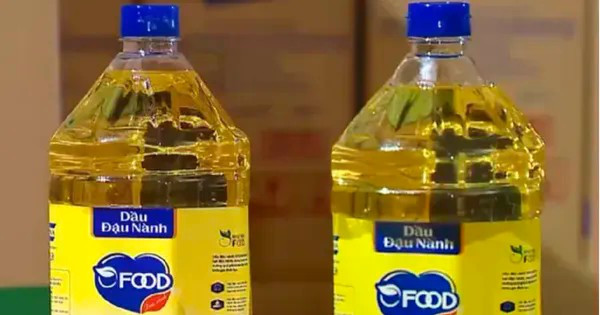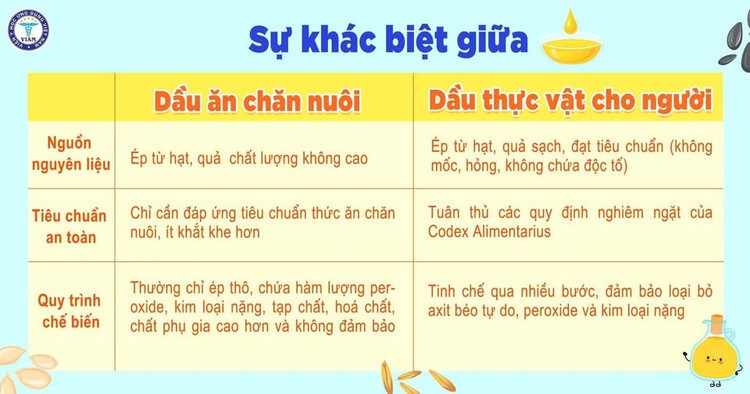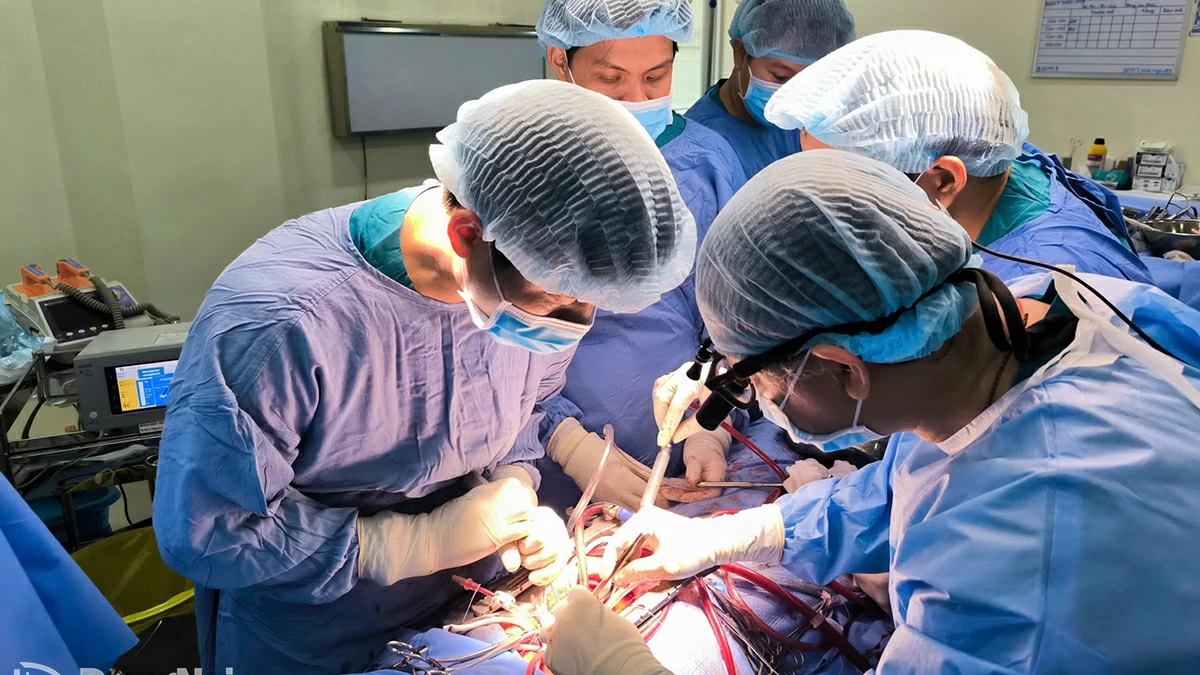Recently, Hung Yen Provincial Police in coordination with relevant agencies have dismantled a fake cooking oil production and consumption ring with a scale of up to tens of thousands of tons.
Accordingly, Nhat Minh Food Production and Import-Export Company Limited used imported cooking oil for animal feed to process into products for human consumption.
Authorities said that the OFood cooking oil brand of Nhat Minh Food Company was widely sold on the market as a vitamin A supplement. However, test results showed that the product did not contain any vitamins as advertised. More seriously, this was a type of vegetable oil that did not meet food safety standards and was only used to make animal feed.
According to the Department of Food Safety - Ministry of Health , this behavior seriously violates food safety standards, potentially affecting public health.
So what is the difference between animal feed oil and human cooking oil?
Cooking oil for livestock
Animal feed oils are vegetable oils from plants such as soybean oil, canola oil, palm oil, sunflower oil, olive oil, etc. used to mix into animal feed (livestock, poultry such as pigs and chickens, etc.) to provide energy.
These oils are usually raw, freshly pressed, unrefined, and processed simply to meet animal feed standards. Therefore, these oils do not meet the standards for human use in terms of quality, nutritional value, and food safety.

Cooking oil brings many benefits to livestock and poultry. For poultry (broilers and laying hens):
Increase dietary energy: Vegetable oils contain unsaturated fats that help increase high-quality dietary energy.
Improve digestion and nutrient absorption: Unsaturated fats in vegetable oils help poultry improve their digestive system, increase absorption of fat-soluble vitamins (A, D, E, K) and other nutrients.
Enhanced growth and yield: Supplementation of vegetable oils - especially olive or soybean oil - results in better weight gain in broilers and increased fertility in layers.
Improve health, immunity and reduce the risk of disease: Vegetable oils rich in MUFA/PUFA (unsaturated fatty acids) help enhance the ability to resist oxidative stress, improve immunity and increase the number of lymphocytes, reduce inflammatory reactions, and improve the health of poultry.
Improve egg/meat quality: Flaxseed or canola oil rich in omega‑3 helps improve the omega‑3/omega‑6 fatty acid ratio in eggs, increasing egg and chicken meat quality.
For ruminants (dairy cows, beef cattle):
Increase dietary energy: Just like for poultry, vegetable oils are rich in unsaturated fats, which help increase energy for livestock.
Increase milk production and weight gain: Especially for dairy cows, soybean oil helps increase milk production and helps newborn calves have better resistance.
Improve digestive system: Unsaturated fats in vegetable oils help livestock regulate microflora, enhance digestive health, and absorb nutrients and fat-soluble vitamins (A, D, E, K).
Improve meat and milk quality: Omega-3 and omega-6 oils found in olive oil and flaxseed oil help improve the quality of meat and milk in livestock.

The difference between animal feed oil and human cooking oil
Vegetable oils used in animal husbandry and vegetable oils used for human food processing have the same origin (soybean, sunflower, rapeseed, palm, flaxseed, olive, etc.) but have big differences in purpose, quality, processing procedures and safety standards.
Raw material source: Oil used for human consumption must be pressed from clean, standard seeds and fruits (no mold, spoilage, no toxins), while the standard for pressing seeds for animals is much lower, often using seeds and fruits that do not meet standards.
Safety standards: Cooking oils for human consumption must comply with strict Codex Alimentarius regulations regarding impurities, heavy metals and bacteria. Livestock oils only need to meet less stringent animal feed standards.
Processing: Human cooking oil is refined through the steps of removing impurities, deodorizing and decolorizing, ensuring the removal of free fatty acids, peroxides and heavy metals. Livestock oil is usually only crudely pressed, containing higher levels of peroxides, heavy metals, impurities, chemicals, additives and is not hygienic.
How harmful is cooking oil for pets when used in food processing?
Using cooking oil for human consumption can lead to some harmful effects on human health, specifically:
High peroxide content: Formation of free radicals increases oxidative stress in the body, increasing the risk of cancer, cardiovascular disease, chronic inflammation, liver and kidney damage,...
Heavy metals in livestock oil such as lead, cadmium,... are toxic to the body, especially the liver and kidneys.
Chemicals, additives, molds, bacteria, etc. that are not allowed in cooking oil for humans can cause digestive disorders, poisoning, reduced nutrient absorption, intestinal weakness and affect health.
Oxidation: During the cooking process, if the oil is heated repeatedly, it can oxidize and produce toxic substances such as peroxide, trans fat, free radicals, etc., increasing the risk of cancer, cardiovascular disease, chronic diseases, etc.
Vegetable oil is a high quality energy source for livestock, helping to improve growth performance and meat/egg production. When used properly, this is an effective and economical solution in livestock and poultry farming.
However, due to the standards and production processes not meeting the quality standards compared to when producing vegetable oil for human consumption, livestock oil often contains toxic chemicals, increasing the risk of disease for humans.
Therefore, absolutely do not use animal oil to prepare food for humans to avoid harmful effects on health.
Dr. Doan Thu Hong (Vietnam Institute of Applied Medicine)
Source: https://khoahocdoisong.vn/tuyet-doi-khong-dung-dau-gia-suc-che-bien-thuc-an-cho-nguoi-post1550688.html





































































































Comment (0)